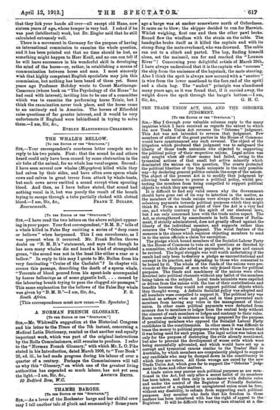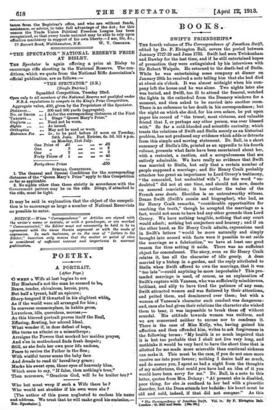THE TRADE UNION ACT, 1913, AND THE OSBORNE JUDGMENT.
[To THE EDITOR OF THE 'SPECTATOR."]
Sin,— May I through your valuable columns reply to the many
inquiries which I have received as regards the extent to which the new Trade Union Act reverses the " Osborne " judgment.
This Act was not intended to reverse that judgment. Few members of either of the great parties in the House of Commons would have countenanced any such reversal. The object of the litigation which produced that judgment was to safeguard the
liberty of those trade unionists who objected to supporting the political policy of -their respective unions. Legal action waa only sought when all- other. means had failed, owing to the
tyrannical actions of that small but active minority which dominated the unions on this question. The courts protected the political liberties of the trade unionists in the only possible way—by declaring general politics outside the scope of the unions. The object of the present Act is to modify that judgment by allowing trade unions to pursue a political policy, whilst pro- tecting the members from being compelled to support political objects to which they are opposed. It is difficult to find any valid reason why the Government should have gone out of its way to interfere in the matter, as the members of the trade unions were always able to make any voluntary payments towards political purposes which they might think fit. From a national point of view the Act is a very bad one, and wholly contrary to the spirit of our electoral laws, but I am only concerned here with the trade union aspect. The Act, as strengthened by amendments in both Houses of Parlia- ment, if strictly administered, does not greatly offend against the- liberty of the individual member, and supports rather than reverses the "Osborne" judgment. The worst feature of the measure is the clause which requires objecting members to send in to the union officials a claim for exemption.
The pledge which bound members of the Socialist Labour Party in the House of Commons to vote on all questions as directed by a committee, which also acted as paymaster, is gone and cannot
be revived. The legal struggle was well worth undertaking if the result had only been to destroy a pledge so unconstitutional and
corrupt in its practice, and degrading to those who consented to be bound by it. The whole of the funds of the unions were pre- viously at the disposal of men who only joined them for political purposes. The funds and machinery of the unions were often diverted into political channels without any ballot of the members being taken on the subject. Loyal trade unionists were expelled or driven from the unions with the loss of their contributions and benefits because they would not support political objects which_ they thought wrong. A definite Socialist policy was adopted and all members were compelled to support it. The political levy was marked as arrears when not paid, and in time prevented such members from having any voice in the management of their
union. In other cases political payments were deducted from
moneys due to members or lodges from the central body without the consent of such members or lodges and contrary to their rules.
Rules were already in existence or being prepared for the purpose of penalizing members who opposed the Socialist Labour Party candidates in the constituencies. In other cases it was difficult to trace the money to political purposes even when it was known that it was being used for such purpose. The legal action was taken not only for the purpose of destroying the evils already mentioned, but also to prevent the development of worse evils which were being successfully advocated, and which would have set up a. corrupt and tyrannical caucus similar to the Trades' Hall in
Australia, by which members are compulsorily pledged to support any candidate who may be dumped down in the constituency in which they are voters. All these wrongs are cured by the new- Trade Union Act, which goes far to support the "Osborne " judg- ment in these and other matters. A trade union may pursue such political purposes as are men-. tioned in the Act, but only after a secret ballot of its members has been taken, and then only in accordance with definite rules and under the control of the Registrar of Friendly Societies. Any member of a registered or unregistered union must be free, without any disability, to refrain from supporting such political purposes. Any member who feels that his freedom in these matters has been interfered with has the right of appeal to the- - Registrar, It will be difficult for working men situated at a disr- tance from the Registrar's office, and who are without funds, assistance, or advice, to take full advantage of the Act ; for this reason the Trade Union Political Freedom League has been reorganized, so that every trade unionist may be able to rely upon effective machinery in support of his own liberty.—I am, Sir, &c.,











































 Previous page
Previous page